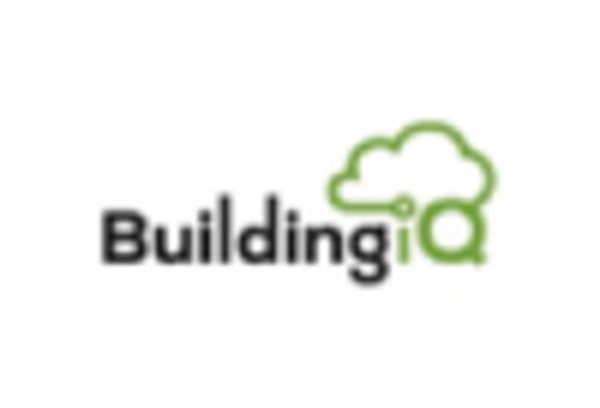Rising Energy Costs
The escalating energy costs in South Korea are driving the next generation-building-energy-management-systems market. As energy prices continue to rise, businesses and homeowners are increasingly seeking solutions to optimize energy consumption. The implementation of advanced energy management systems can lead to substantial savings, potentially reducing energy bills by up to 30%. This financial incentive encourages the adoption of innovative technologies that enhance energy efficiency. Furthermore, the South Korean government has been promoting energy conservation initiatives, which align with the objectives of the next generation-building-energy-management-systems market. As a result, the demand for these systems is likely to grow, as stakeholders aim to mitigate the impact of rising energy expenses.
Technological Advancements
Rapid technological advancements are reshaping the next generation-building-energy-management-systems market in South Korea. Innovations in artificial intelligence, machine learning, and data analytics are enabling more sophisticated energy management solutions. These technologies allow for real-time monitoring and predictive analytics, which can optimize energy usage and reduce waste. For example, smart building technologies can lead to energy savings of up to 25% by automating lighting and HVAC systems based on occupancy patterns. As these technologies become more accessible and affordable, the market is likely to witness increased adoption. The integration of advanced technologies not only enhances operational efficiency but also supports sustainability goals, making it a crucial driver for the next generation-building-energy-management-systems market.
Growing Environmental Awareness
There is a notable increase in environmental awareness among consumers and businesses in South Korea, which is positively influencing the next generation-building-energy-management-systems market. As the public becomes more conscious of climate change and its effects, there is a growing demand for sustainable practices. This shift in mindset encourages the adoption of energy management systems that promote energy efficiency and reduce carbon footprints. According to recent surveys, over 70% of South Koreans express a preference for eco-friendly products and services. This trend is likely to drive investments in the next generation-building-energy-management-systems market, as organizations seek to align their operations with environmentally responsible practices.
Government Incentives and Support
The South Korean government has been actively promoting energy efficiency through various incentives and support programs, which significantly impact the next generation-building-energy-management-systems market. Financial incentives, such as subsidies and tax breaks, are available for businesses and homeowners who invest in energy-efficient technologies. For instance, the government has allocated approximately $500 million to support energy efficiency projects in the commercial sector. This financial backing encourages the adoption of advanced energy management systems, as stakeholders are motivated to take advantage of these benefits. Additionally, the government's commitment to reducing greenhouse gas emissions aligns with the objectives of the next generation-building-energy-management-systems market, further driving its growth.
Urbanization and Smart City Initiatives
The rapid urbanization in South Korea is a significant driver for the next generation-building-energy-management-systems market. As cities expand, the demand for efficient energy management solutions becomes increasingly critical. The South Korean government has launched various smart city initiatives aimed at integrating advanced technologies into urban infrastructure. These initiatives often include the deployment of energy management systems that optimize resource usage and enhance sustainability. For instance, the Busan Smart City project aims to implement energy-efficient technologies across urban developments, potentially reducing energy consumption by 20%. This focus on smart city development is likely to propel the growth of the next generation-building-energy-management-systems market as urban planners and developers seek innovative solutions to meet the challenges of urban living.
















